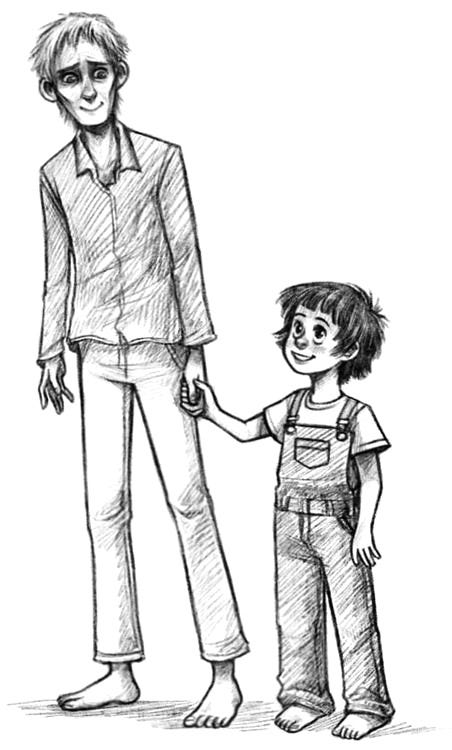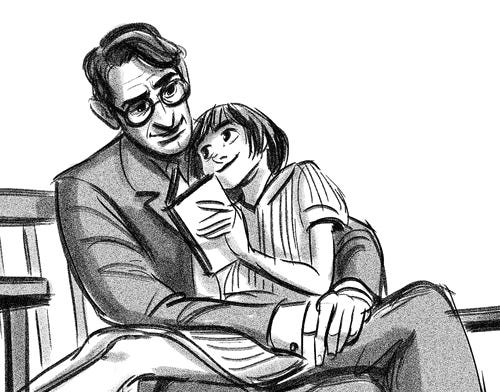To Kill a Mockingbird by Harper Lee
Atticus Finch, the reasoned stoic; Scout Finch, the tomboy philosopher; Boo Radley, the ghost turned guardian angel. But did Atticus actually win anything?
Dear Reader,
Is it spring or summer where you live? In the past week, we have had some summer rains, and it cooled off a bit and got super hot again. Anyways, I'm doing well now and truly appreciate all who sent your kind wishes my way. Last weekend was a long one, and I could revisit one of my favorite books: To Kill a Mockingbird. If we think about this masterpiece, all that comes to mind is Atticus Finch, the reasoned stoic; Scout Finch, the tomboy philosopher; Boo Radley, the ghost turned guardian angel. And when I picked up the book again, I told myself that I'm not going to read for the plot but to ask myself a single question: Did Atticus actually win anything?
For those who don’t know the story, here is a summary for you: The story is narrated and seen through the eyes of Jean Louise "Scout" Finch, a young girl in the fictional town of Maycomb, Alabama. She lives with her older brother, Jem Finch, and their widowed father, Atticus Finch, a principled lawyer with a strong moral compass. The first part of the book revolves around Scout's childhood adventures and her curiosity about her mysterious neighbor, Boo Radley. It progresses to the children's awareness of the unjust world around them. The core of the story is Atticus defending Tom Robinson, a man falsely accused of a crime. Even with the evidence and truth proving Tom's innocence, deeply rooted racial and social prejudices lead to his conviction. As Scout grows, she starts to understand the complexities of human nature and society. It is through her experiences and Atticus's quiet strength that the novel delivers a message: it is a sin to kill a mockingbird, a metaphor for harming the innocent — is a sin.
"Until I feared I would lose it, I never loved to read. One does not love breathing".
So now, coming to what I could analyze during this time of rereading:
Atticus is a man who believes in the system, believes in its promise of justice, and he argues within it. But he still watches it crush an innocent man. He tells Scout, "You never really understand a person until you consider things from his point of view… until you climb into his skin and walk around in it". And he lives by it. But in the face of Maycomb society's deep-rooted decay, is empathy enough? We see that Atticus views empathy not as a solution, but as a tool. It doesn't save Tom, it doesn't change Maycomb. It certainly did not overturn the verdict. But what does it do? All I could think of it, it did shape Scout. It is as if the lesson is inward. It is not about changing the world but refusing to let the world change you. Atticus Finch is not wrong to defend it. But he is wrong to think the world will listen.
"You may not be able to fix Maycomb. But you can choose not to become it".
But the only person who does protect someone in the novel is Boo Radley, silently outside the system, in the shadows, unseen, and unacknowledged. When Boo saves the children, eventually committing a murder in their defense, the town chooses to lie. "Let the dead bury the dead", says the Sheriff. And Atticus, the supposed moralist, surprisingly agrees. But there is a silver lining to this: truth is abandoned for the sake of innocence, and in this case, a necessary lie becomes its own form of justice. We no longer live in an age where we question "good vs. bad", but rather "bad vs. more bad". Maybe I must put it this way — there is no definite good and definite bad anymore.
One other thing I like about Atticus is his parenting. In Jem and Scout's eyes, Atticus is a distant figure. But what I love the most about him is that he shapes minds. He is a simple person who reads the newspaper and books to himself and to his children quietly at night until he falls asleep. He never disciplines through shouting or physical discipline but with words. But slowly, they realize and see him more clearly: he is raising them not just to behave, but to understand. Not just merely to obey, but to think. He also lets them attend the trial, so they see for themselves what is the world they are going to step into. He speaks to them like adults. He never simplifies the truth for the sake of comfort. Atticus teaches them to face the world as it is and live decently. In this, Atticus becomes less of a father and more of a moral teacher.
"To Kill a Mockingbird" is not a story of justice done or undone, because it clearly says truth isn't enough. In the end, maybe the mockingbird doesn't just symbolize innocence. Maybe it's also a symbol of how society punishes those who speak when they are not supposed to. Those punished not for their crimes, but for refusing silence.
So, did Atticus win anything? Not in the way we are trained to measure victory or success. He did not win the case. He did not win the town. He could not change Maycomb. He did not defeat hatred. But after rethinking again, I can say he sure did win. It is in what he passed on to his children. The moral compass. In a world where rightness is often buried under convenience or fear, he showed them (and us) that decency is not measured by outcome, but by endurance and effort. And maybe, that is all the world allows.
"Atticus, he was real nice..."
"Most people are, Scout, when you finally see them".
A choice, every day, to see clearly, and still act kindly. That is what Atticus Finch teaches.
Until next time,
Yana
A Note To You
What do you think? Is it enough to live by your principles even if it doesn't change the world around us? Or should we judge or measure the worth of our good actions by whether they actually make an impact?



